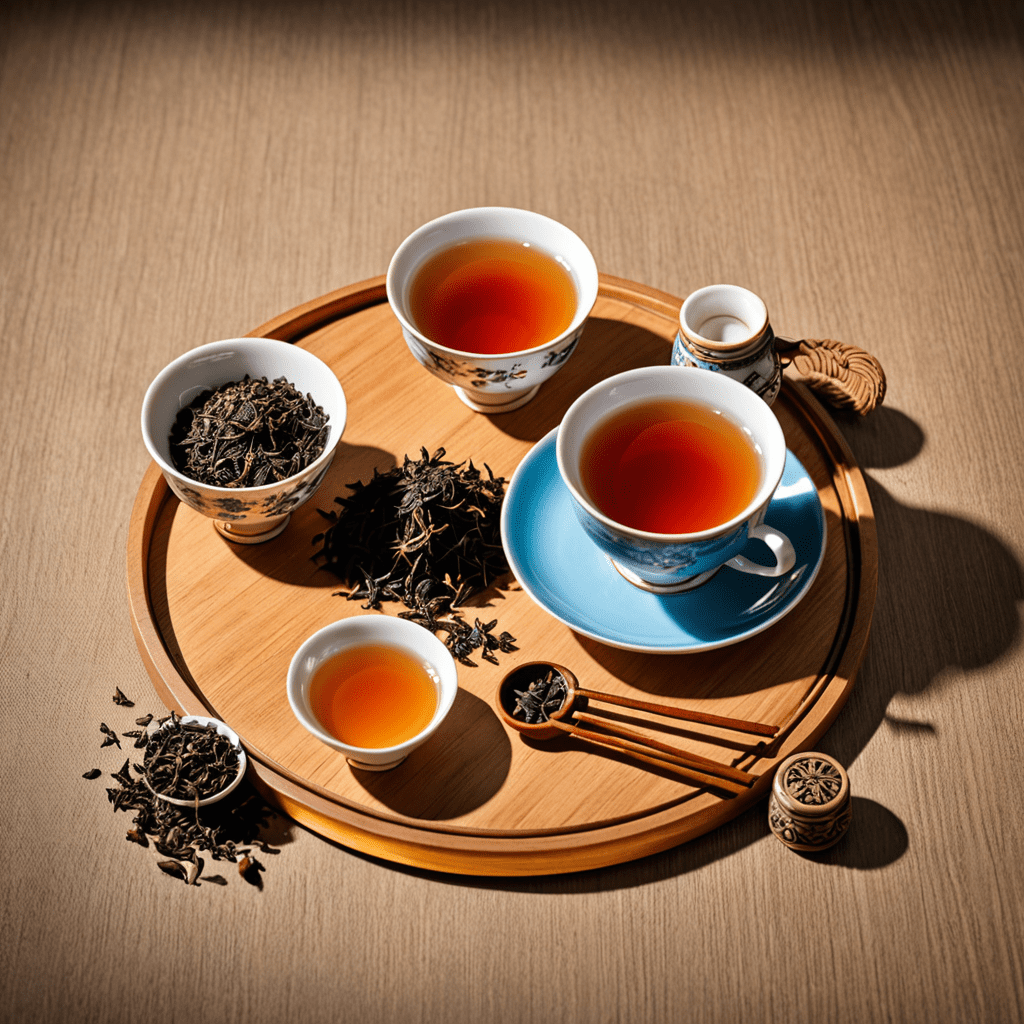
Assam Tea: A Historical Legacy
Assam tea, renowned for its robust flavor and distinctive malty notes, holds a rich historical legacy intertwined with the vibrant culture of the Indian subcontinent. Its origins can be traced back to the 1820s, when British explorers discovered indigenous tea plants thriving in the lush Brahmaputra Valley of Assam. Recognizing the commercial potential of this discovery, they established tea plantations, introducing Assam tea to the world stage. Over the centuries, it has become an integral part of Indian heritage, symbolizing both cultural identity and economic prosperity.
The Unique Terroir of Assam
The Brahmaputra Valley, where Assam tea is predominantly cultivated, boasts a unique terroir that imparts its characteristic qualities. The region's tropical climate, abundant rainfall, and fertile soil provide ideal conditions for tea plants to flourish. The Brahmaputra River, a mighty waterway that flows through the valley, further contributes to the terroir by depositing nutrient-rich silt on the surrounding floodplains. This combination of factors gives Assam tea its distinctive flavor profile, with its full-bodied, malty character and hints of earthiness.
Cultivating Assam Tea: Tradition and Innovation
Assam tea cultivation is a blend of traditional practices and modern innovations. Tea gardens, often spanning vast areas, are carefully managed to ensure optimal growing conditions. The tea plants are meticulously pruned and fertilized to promote healthy growth and high yields. While traditional methods of harvesting and processing have been passed down through generations, modern techniques have also been introduced to improve efficiency and quality control. Through a harmonious balance of tradition and innovation, Assam tea growers strive to produce the finest teas that meet the demands of discerning palates worldwide.
The Art of Plucking and Processing
The meticulous art of plucking and processing contributes significantly to the exceptional quality of Assam tea. Skilled tea pluckers selectively harvest the youngest and most tender leaves, known as the "two leaves and a bud." This careful selection ensures that only the finest leaves are used in tea production. The harvested leaves undergo a series of intricate processes, including withering, rolling, oxidation, and drying. Each step is meticulously controlled to preserve the tea's distinctive flavor and aroma, resulting in the rich and complex character that is synonymous with Assam tea.
Assam Tea: A Rainbow of Flavors and Nuances
Assam tea offers a diverse spectrum of flavors and nuances, catering to a wide range of preferences. The region's varied growing conditions, coupled with different processing techniques, give rise to a kaleidoscope of flavors. From the bold and malty to the delicate and floral, Assam teas offer a captivating sensory experience. Whether enjoyed as a standalone brew or blended with other teas, Assam tea's versatility makes it a beloved choice among tea enthusiasts worldwide. Its rich flavor profile pairs exceptionally well with milk and sugar, making it a popular choice for traditional afternoon teas.
6. Brewing Assam Tea: The Perfect Cup
The art of brewing Assam tea is a delicate process that unveils its exquisite flavors. To savor the full essence of this exceptional tea, follow these simple steps:
Measure and Heat the Water: Measure one teaspoon of Assam tea leaves for every cup of water desired. Heat fresh, filtered water to a temperature between 195-205°F (90-96°C).
Choose the Brewing Method: Assam tea can be brewed using a variety of methods, including teapots, French presses, or tea balls. Select the method that best suits your preference and quantity of tea.
Steep for Optimal Flavor: Allow the tea leaves to steep for 3-5 minutes, depending on the desired strength. For a bolder flavor, steep for a longer duration.
- Strain and Serve: Once steeped, strain the tea leaves to separate the liquor. Pour into cups and savor the rich, full-bodied brew.
7. Assam Tea's Health Benefits: A Natural Elixir
Beyond its captivating flavors, Assam tea offers an array of health benefits, making it a natural elixir for well-being:
Rich in Antioxidants: Assam tea is a rich source of antioxidants, which scavenge free radicals and protect cells from damage. These antioxidants contribute to overall health and may reduce the risk of chronic diseases.
Boosts Immunity: The antioxidants and polyphenols in Assam tea have been shown to strengthen the immune system, protecting against infections and boosting resistance to diseases.
Promotes Heart Health: The flavonoids present in Assam tea may help improve cholesterol levels and reduce the risk of heart disease.
- Improves Digestion: Assam tea contains compounds that can aid digestion and soothe an upset stomach.
8. Economic Significance of Assam Tea
Assam tea plays a vital role in the economy of India, particularly in the state of Assam. The tea industry provides employment to a significant portion of the population and contributes substantially to the region's GDP. Assam tea is also a major export commodity, generating foreign exchange and boosting the national economy.
9. Sustainable Practices in Assam Tea Cultivation
The tea industry in Assam recognizes the importance of sustainable practices to preserve the environment and ensure the long-term well-being of its growers and communities. Many tea gardens have adopted sustainable farming techniques, including:
Organic Farming: Some tea gardens have transitioned to organic farming methods, eliminating the use of chemical pesticides and fertilizers.
Ethical Labor Practices: Tea gardens are committed to ethical labor practices, ensuring fair wages and safe working conditions for their employees.
Water Conservation: Efficient irrigation systems and water conservation measures are implemented to minimize water usage and protect water resources.
- Soil Management: Sustainable soil management practices are employed to maintain soil fertility and prevent erosion.
10. Assam Tea: A Cultural Icon
Assam tea has become an integral part of Indian culture and is deeply interwoven with the social fabric of the region. It is often served at social gatherings, religious ceremonies, and special occasions. Assam tea has also inspired art, literature, and music, further cementing its status as a cultural icon.
FAQ
Q: What is the unique characteristic of Assam tea?
A: Assam tea is renowned for its robust flavor, malty notes, and full body.
Q: What is the ideal brewing time for Assam tea?
A: The optimal brewing time for Assam tea is between 3-5 minutes, depending on the desired strength.
Q: What are the health benefits of Assam tea?
A: Assam tea is rich in antioxidants, boosts immunity, promotes heart health, and aids digestion.
Q: Is Assam tea sustainable?
A: Many tea gardens in Assam have adopted sustainable practices, such as organic farming, ethical labor practices, water conservation, and soil management.


